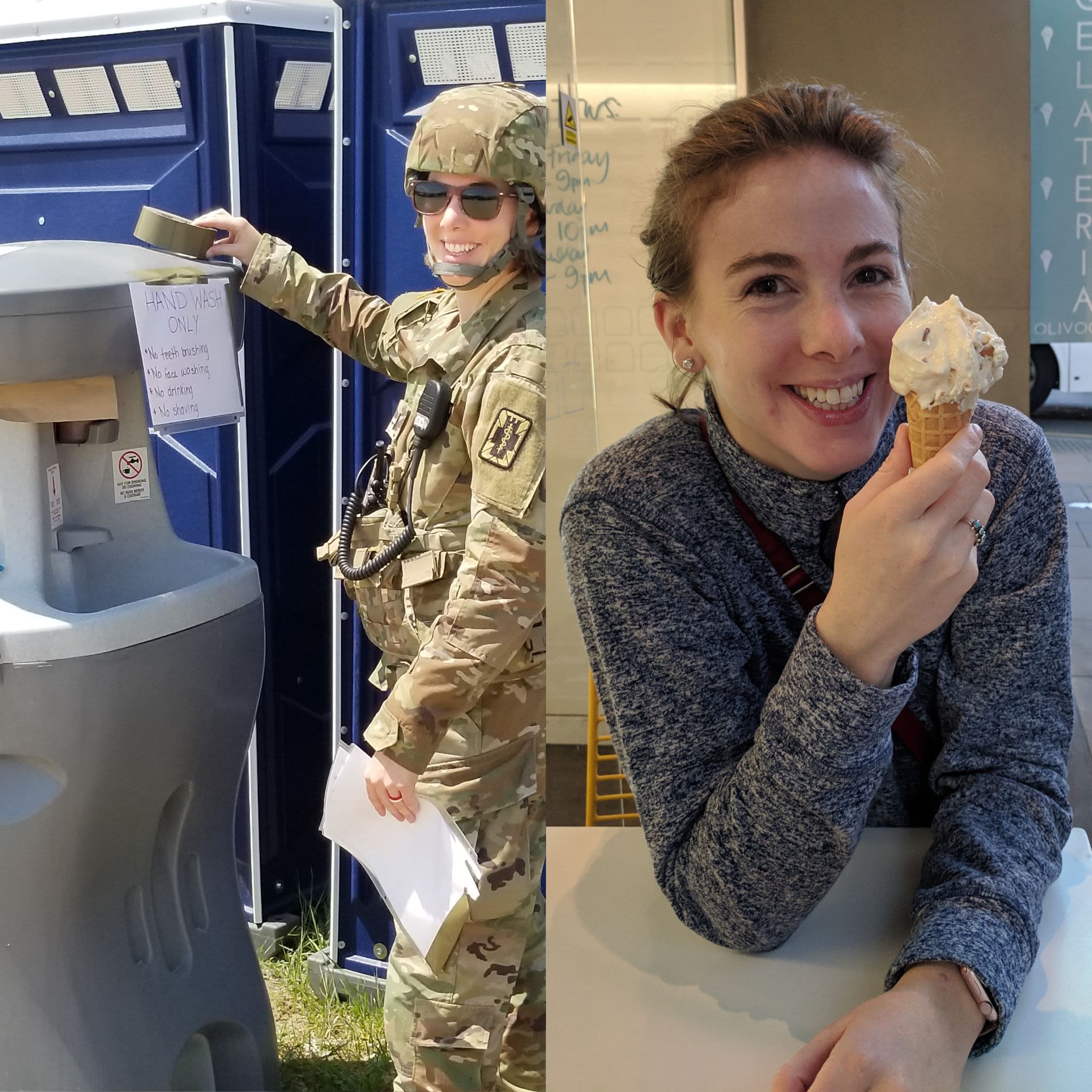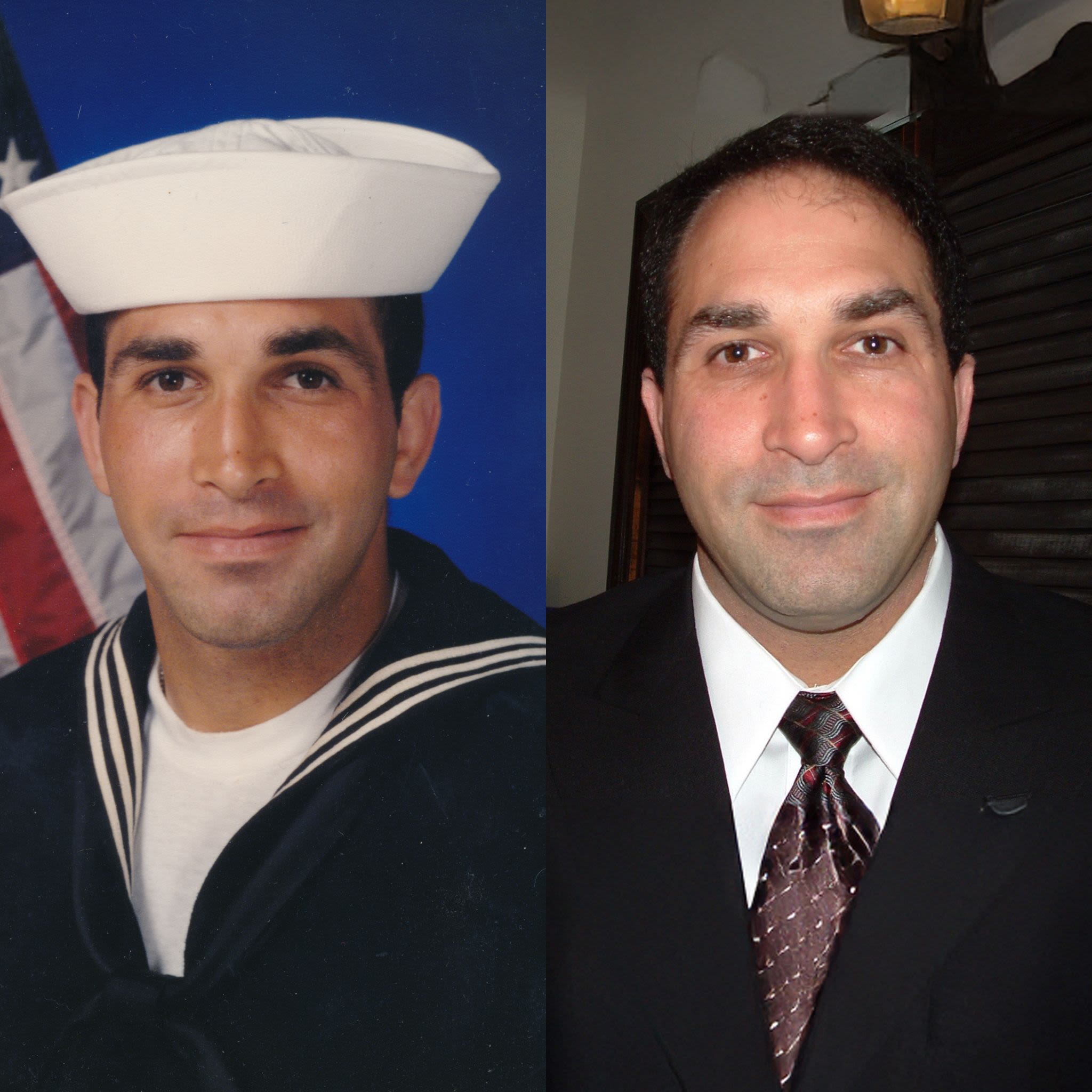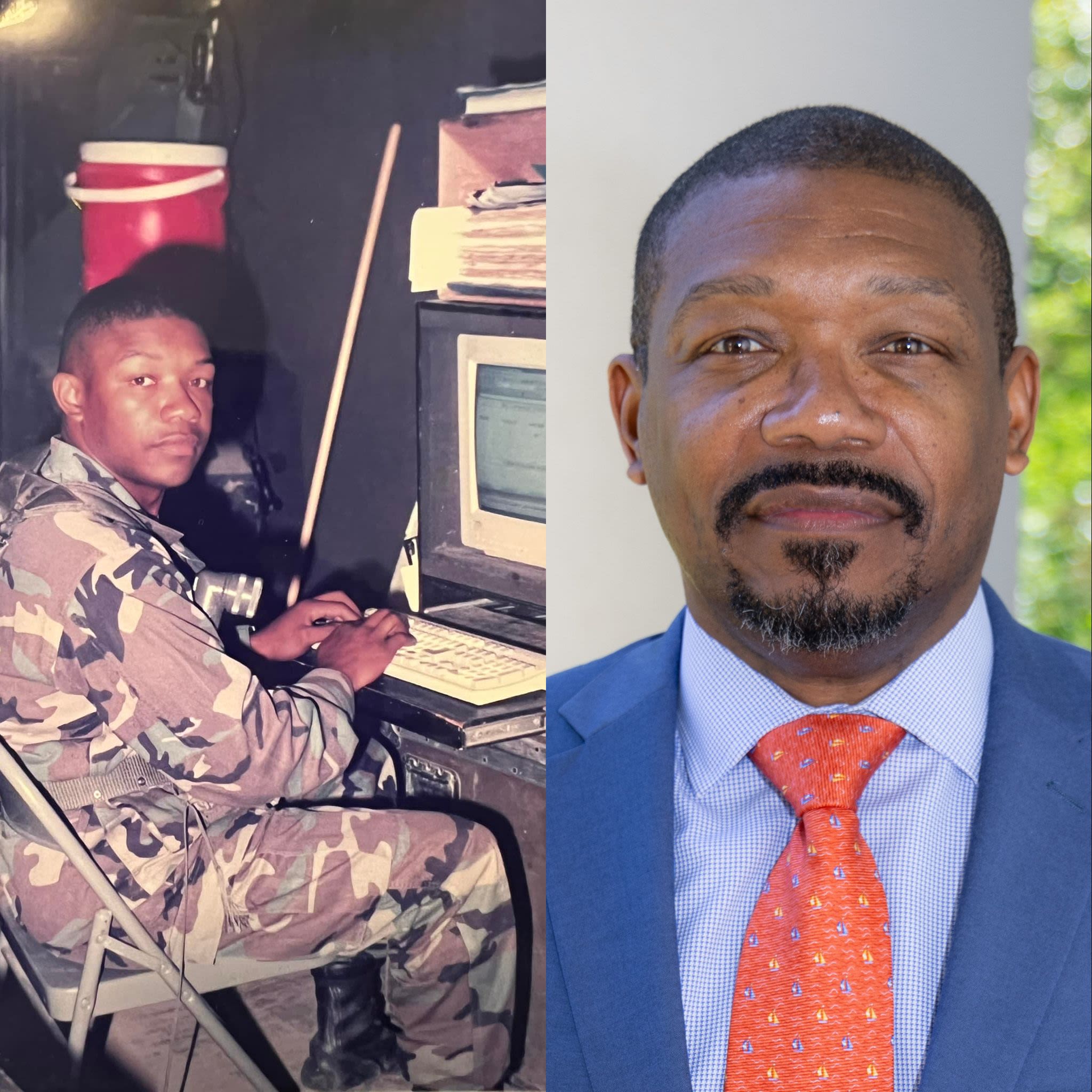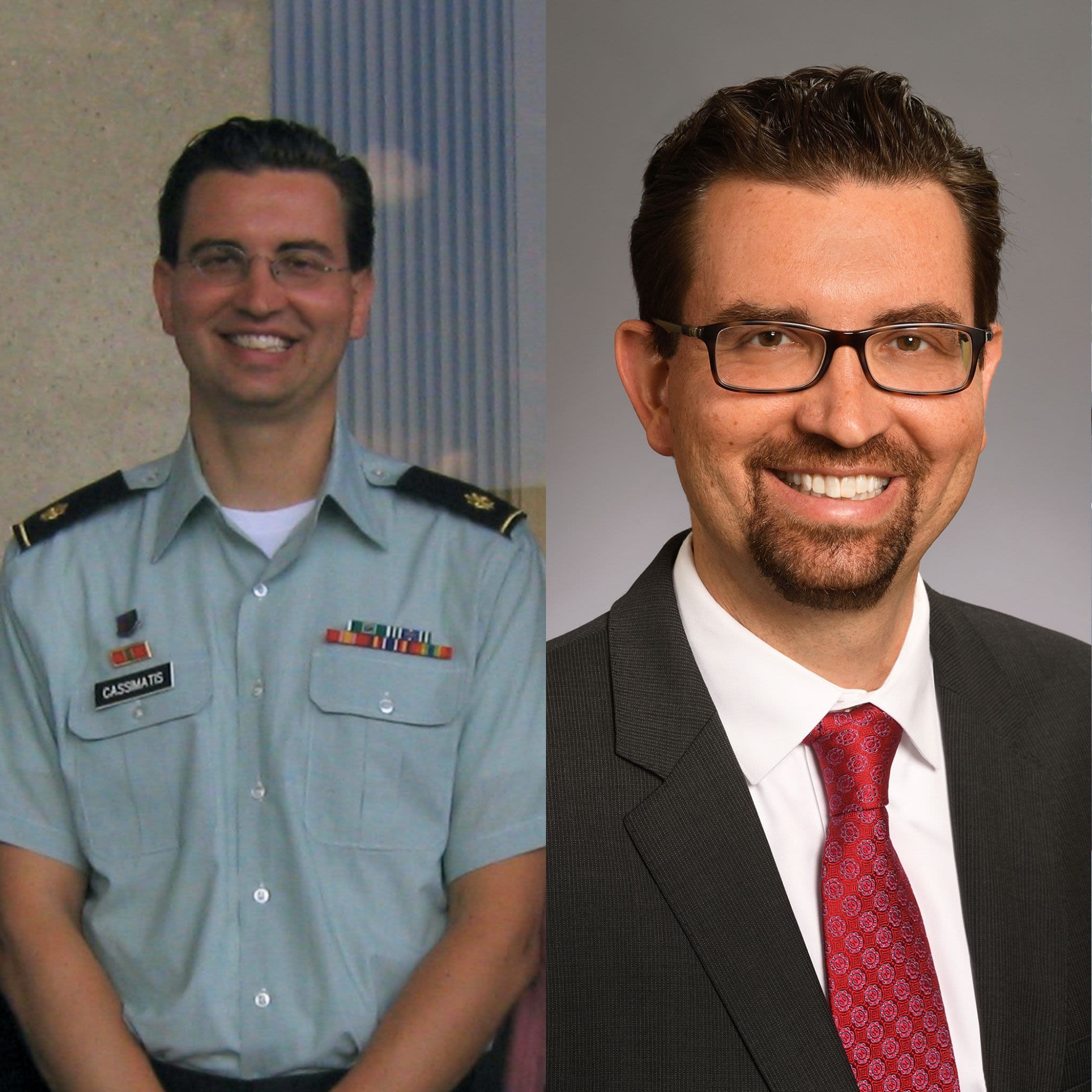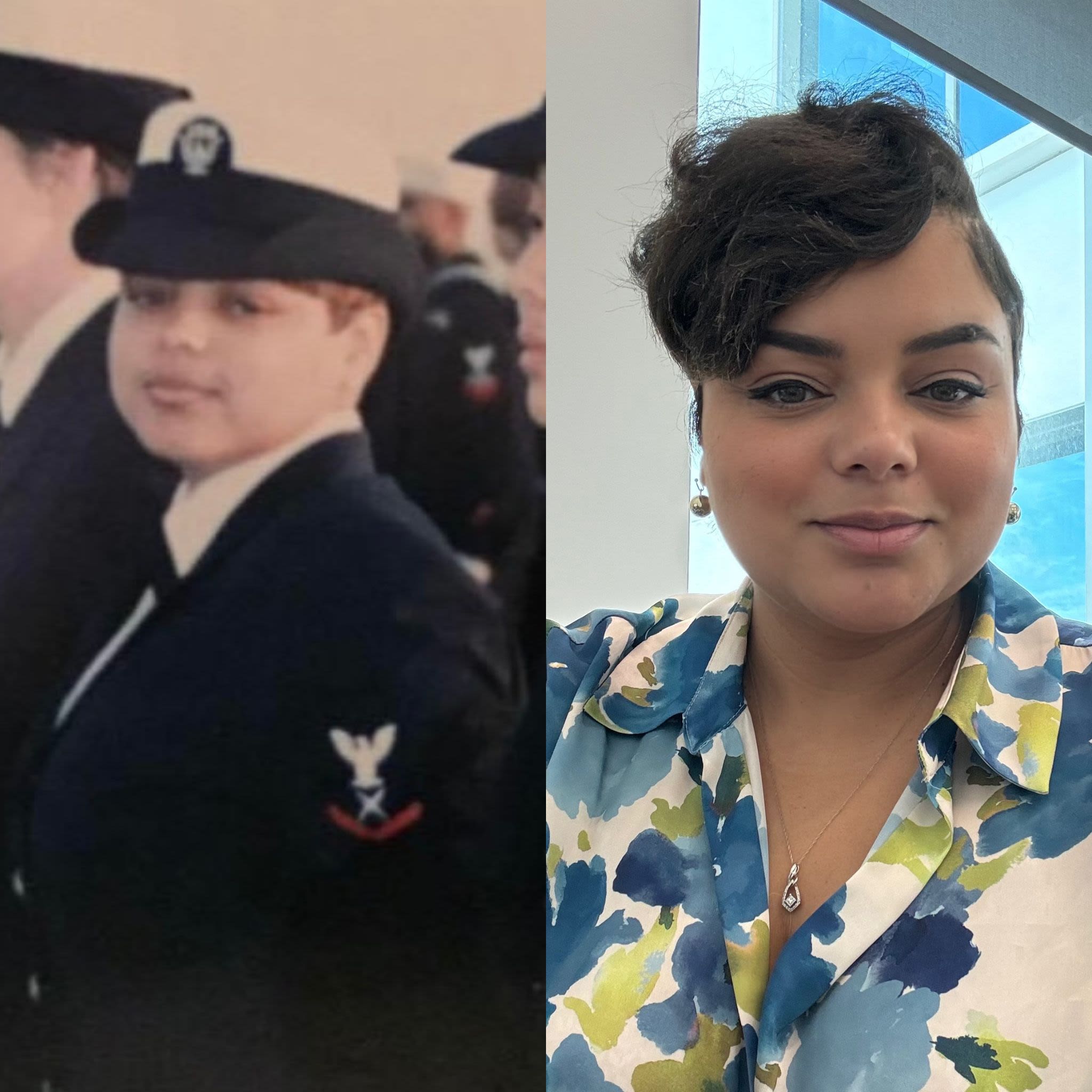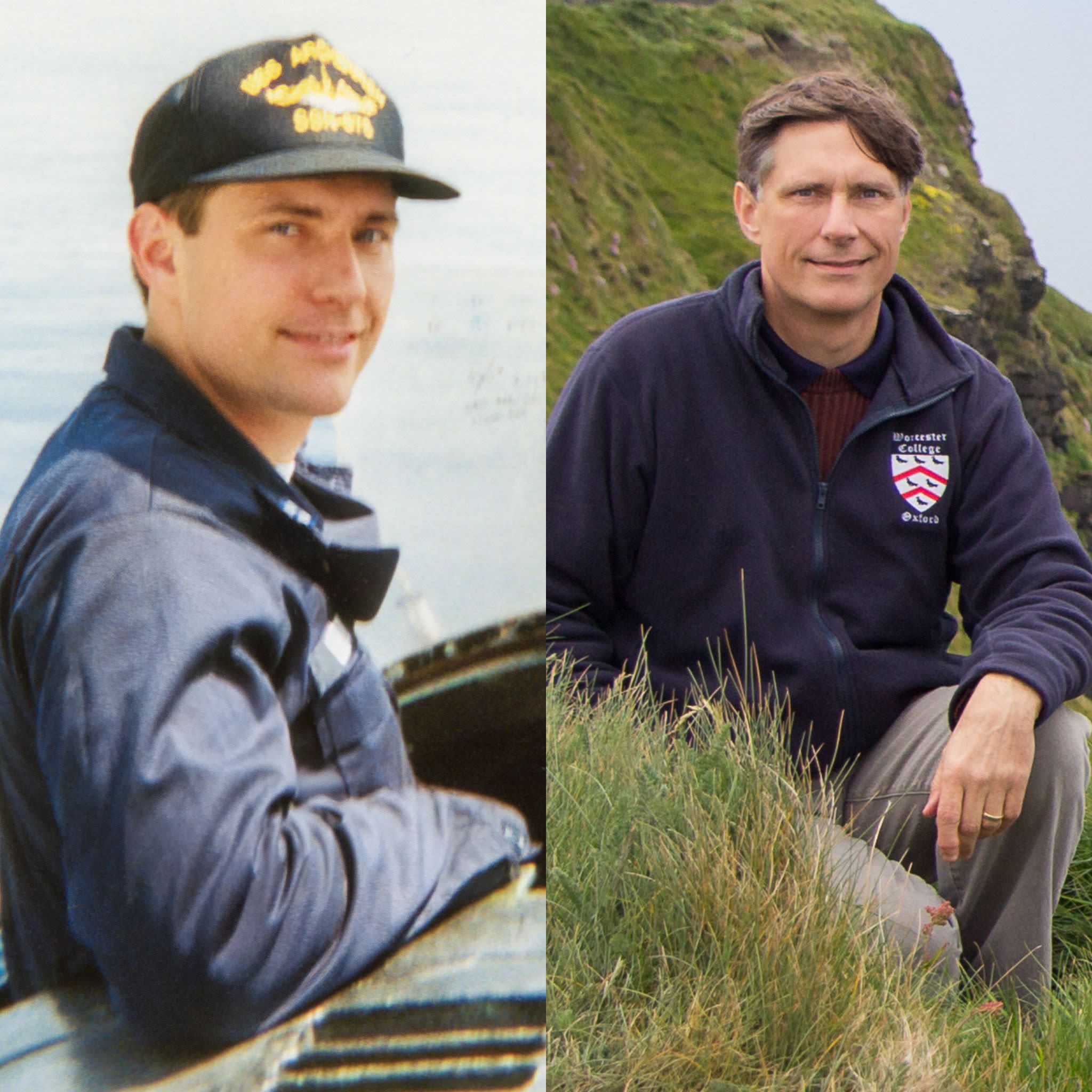Honoring Emory Veterans
How serving in the military shaped the lives and work of those across the Emory community
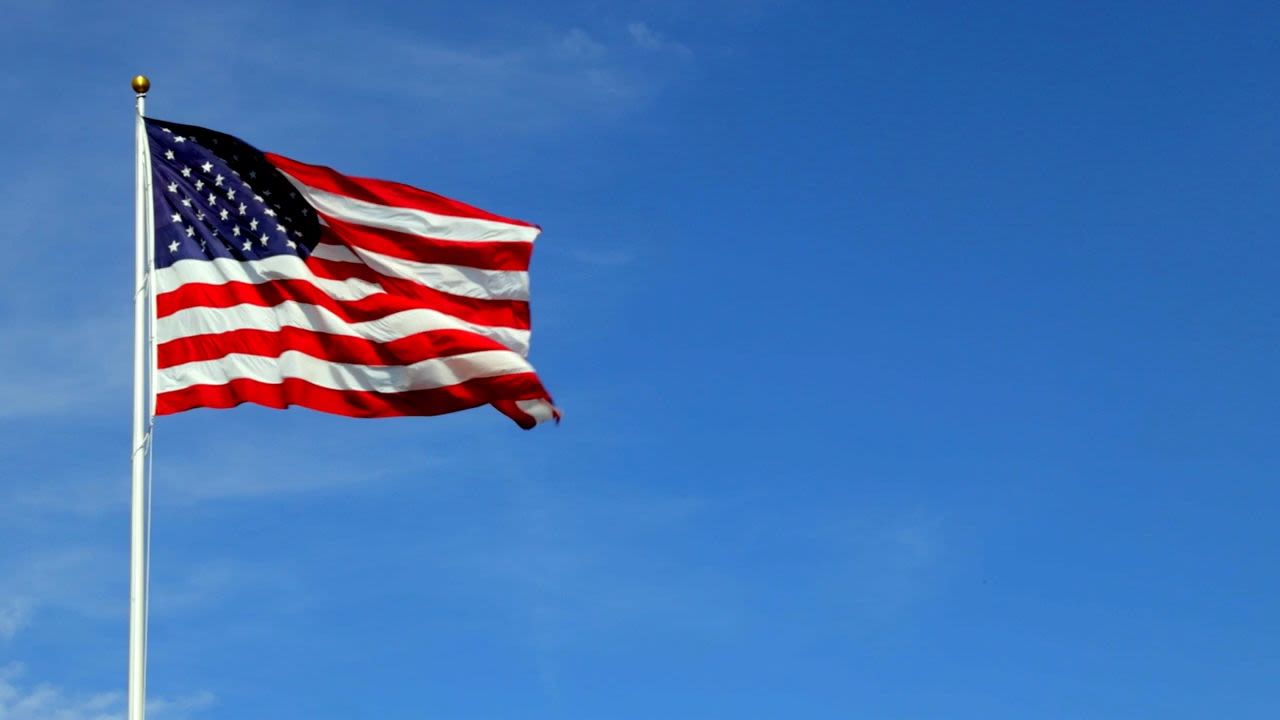
Honoring Emory Veterans
How serving in the military shaped the lives and work of those across the Emory community
By Michelle Ricker | Nov. 11, 2024

Veterans Day is a time for civilians to thank those who have served. For veterans, it's a time to reflect on the myriad ways military service has shaped their lives.
Emory works to support veterans in multiple ways, from education benefits for students to the Emory Healthcare Veterans Program, the Veterans Affairs Nursing Academic Partnership and more.
But what's less obvious is how many veterans hold roles across Emory and how their experiences in the service impact their work today.
We've highlighted six Emory veterans to offer insight into their experiences and professional lives.

Susan Hoffman
- Emory role: Fifth year PhD candidate in the Department of Epidemiology at the Rollins School of Public Health through the Laney Graduate School
- Military service: After graduating from Dickinson College, I received my commission as a 2LT into the U.S. Army Reserves (USAR), Medical Service Corps. In the early days, I served as a Personnel Officer (S1), providing administrative support to a Combat Support Hospital. After receiving my master’s degree in public health, I changed roles and served as an Environmental Science Office (ESEO/72D). In this role, I was the subject matter expert on epidemiological programs and practices directed toward disease and illness prevention, supporting operations by conducting risk assessments associated with clinical operations and analyzing data and reports on health trends or issues that may affect troop preparedness. In 2020, I deployed to New York City to support the COVID-19 pandemic response as the Battalion-level epidemiologist. For my efforts throughout my time in the military, I earned the Joint Service Achievement Medal and the Army Achievement Medal (2 OLC).
“I was raised in a family that values service to the country and the world, with five generations of military service on my father’s side and four generations on my mother’s. I carried this with me during my eight years of time in the USAR and throughout my civilian career and time at Emory.
“My Army training developed my leadership, organizational, teamwork and strategic thinking abilities and had a powerful influence on the person I am today. All of these skills have been instrumental in my success as a PhD student at Emory and will continue to serve me in my public health career. I look back on my time in the Army with fondness and am thankful for opportunities the military foundation has afforded me.”
Michael Deryck
- Emory role: Senior applications developer/analyst in Research Administration IT
- Military service: I served in both the U.S. Navy and the U.S. Coast Guard as a medical corpsman/search-and-rescue (SAR) flight paramedic. I had the honor and privilege of working my way up the enlisted ranks to command two medical units and a SAR rescue ship. Some of the fun included flying in a HH65 help (or on a SAR rescue boat) to perform SAR missions, busting drug smugglers as part of a LEDET unit and providing exemplary medical care to thousands of USN/USCG personnel and civilians in perilous situations. When I left Miami Beach, my medical unit was the “Top Gun” for SAR medics in the U.S. Coast Guard.
“Military experience prepared me well for the challenges and politics of a civilian career. Being patient, respectful, purposeful, detailed, holding myself (and others) accountable, calm in the face of pressure and/or chaos and decisiveness are the military skills that have been the most useful during my career with Emory Institutional Review Board (IRB) and the Office of Research Administration IT (ORAIT).
“The very first tenet of leadership that I learned was this: your crew comes first, ALWAYS. A true leader will defend and serve the best interests of his/her crew over the politics, egos, ranks, titles and BS that are threats to the team and its mission. These values have helped me immensely during my career with Emory, as a father and as a husband. ”
Marvell Nesmith
- Emory role: Associate dean of academic affairs and instructional design for Goizueta Business School
- Military service: During my four years of service in the U.S. Army (1998-2002) where I had the final rank of Sergeant E-5, I held two key positions: Assistant Chief of Academic Records at Fort Benning, Georgia, and Company Training Manager at Camp Casey, Korea. As Assistant Chief of Academic Records, I managed a team where we handled the academic records of advanced training programs, overseeing more than 2,200 monthly graduation records and entries and ensuring 100% accountability for more than 1.5 million documents. I also led a team of six in handling records for 23 advanced training courses, improving file tracking processes by over 25%.
As Company Training Manager in Korea, I provided oversight and accountability for $2.5 million in equipment and supplies and maintained training records for 350 individuals. I also implemented a quality control system for the Fraud, Waste and Abuse (FWA) program, reducing incidents by 20%.
This experience reflects my commitment to structure, accountability and continuous improvement in demanding environments.
“My military experience instilled in me a strong foundation in accountability, process optimization and effective team management, all of which have been key to my success in academic administration and leadership roles. In the U.S. Army Infantry School, where I managed large-scale record-keeping, equipment accountability and team oversight, I learned the importance of attention to detail and systems management — skills I continue to apply as associate dean for academic affairs.
“The rigor of managing training records for thousands of personnel and ensuring precise documentation prepared me to handle complex administrative challenges in higher education, where accuracy and strategic oversight are equally critical. Furthermore, the emphasis on continuous process improvement and streamlined operations has guided my approach to enhancing academic services, optimizing resource use and fostering collaborative work environments.
“My ability to navigate and lead diverse teams, refined during my military service, now underpins my efforts to cultivate effective, student-focused academic initiatives that advance institutional goals.”
Dimitri Cassimatis
- Emory role: Martha West Looney Chief of Medicine at Emory University Hospital Midtown (EUHM), general cardiologist in the Division of Cardiology at EUHM and small group advisor at Emory School of Medicine
- Military service: I was in the U.S. Army for 11 years, from 1999-2010. I spent my time in Washington, D.C.; Landstuhl, Germany (Ramstein Air Base); and a deployment to Baghdad, Iraq, in 2007 for about eight months with a Cavalry Regiment in the 10th Mountain Division. I reached the rank of Major, and left with honorable discharge to pursue a career in academic medicine with Emory.
“I treasured the way the military was in many ways a very large family and how we all watched out for each other. As a physician in the military, I loved that cost and access were never an issue with my military patients. Of course, the military is also a huge bureaucracy, and I learned over my 11 years to work within a large bureaucracy. This has helped me navigate other organizational structures without getting frustrated. It is where I learned that what matters most, no matter the size of the organization, is the relationships one has with the people in the organization. The military is also where I learned the tremendous value of showing everyone respect for their role — and how we all truly need each other.
“I also carried away with me a deep sense that a soldier’s life lost is as much a tragedy as a civilian life lost, and yet that the media and public often approach military lives lost in a different way. This was driven home while on deployment in Iraq, when about 900 U.S. Soldiers were killed in 2007. I saw firsthand how daily life fell apart for citizens of a country that was at war. Altogether, this has left me with a strong sense of how war must be a last resort, and that the suffering war causes goes well beyond the loss of life during the war. ”
Shondra Bell
- Emory role: Associate program director in the Center for the Study of Human Health
- Military service: As a Yeoman (YN) in the United States Navy, I managed clerical and administrative tasks for Fleet Air Reconnaissance Squadron Two (VQ-2) in Rota, Spain. Later in my service, I was granted a Secret Clearance and provided administrative support for the Naval Criminal Investigative Service’s Special Agent Afloat Program, handling sensitive correspondence and operational case paperwork while deployed onboard the USS George Washington (CVN 73).
“My time in the military has significantly shaped my experiences in higher education and my professional life in several ways. The discipline and time management skills I developed have helped me stay organized and prioritize tasks while working under pressure.
“Additionally, my military background has fostered resilience and adaptability, which are essential in navigating the constant changes in higher education. Overall, my exposure to diverse perspectives has enriched my understanding of the varied backgrounds and needs of faculty, staff and students. This awareness shapes my approach to support and engagement, allowing me to foster a more inclusive environment.”
Joe LeDoux
- Emory role: Executive leader for education transformation and innovation for Emory University’s School of Medicine and a professor in the Department of Biomedical Engineering
- Military service: I served five years in the United States Navy’s submarine force, from 1987-1992. I served as a Lieutenant on the Sturgeon-class, fast-attack submarine, the USS Archerfish (SSN 678).
“I learned so much from my time in the Navy. I had two primary responsibilities: First, as a watch officer, serving, when at sea, at least six hours per day as the officer of the deck and, when in port, as the ship’s duty officer. Second, as a division officer, overseeing the work of the men in my division.
“Each role challenged me in different ways and taught me different skills and ways of being. For example, during the first few months in the Navy, my submarine was in overhaul, being worked on 24/7 by shipyard workers. As one of only three engineering duty officers on the crew, this effectively meant I had an all-nighter every three days, which taught me a lot about resilience and work ethic.
“While at sea, as officer of the deck, I had overall responsibility for the ship and its operations, under the direction of the commander of the submarine. Serving in these roles helped me develop discipline and learn how to work under high-pressure situations, even when exhausted and sleep-deprived. Nowadays, anytime I’m faced with especially challenging work, I reflect back on my experiences on the USS Archerfish and think to myself, ‘This isn’t so bad.’
“I learned a lot about leadership by serving as a division officer. I had the opportunity to serve as a division officer for several different divisions during my time in the Navy, the last two being sonar and fire control. It is important to point out that I was only in my mid-twenties, yet I was responsible for overseeing these divisions of men, most of whom were older and more experienced than me.
“I learned how important it is to listen, respect and leverage the expertise of those around me while creating a collaborative atmosphere where everyone feels valued. I also learned how to collaboratively adapt, think outside the box and be creative in solving emergent problems with my team. It takes hard work and experience to become the kind of person who embraces, even seeks out, ambiguous and complex situations, and it is that mindset, probably more than any other, that impacts me the most as I carry out my day-to-day responsibilities at Emory.”
Emory’s Support for Veterans

Multiple initiatives for veterans can be found across the university campus and through Emory Healthcare.
Through the Yellow Ribbon program, Emory provides funding to help post-9/11 veterans pay for educational expenses beyond what is covered by the G.I. Bill. Learn more about veterans education benefits at Emory.
Undergraduate students planning military careers can participate in Army or Air Force ROTC through a cross-enrollment agreement with Georgia Tech and Kennesaw State University. Students complete their undergraduate degrees at Emory and military training at Tech.
In May 2024, Goizueta Business School officially welcomed the first cohort to the new MBA program created specifically for military veterans, active duty, National Guard and Reserve personnel.
The working professionals program is designed to leverage management and leadership experience from the military and pair it with business knowledge that gets veterans up to speed and ahead of the curve for a successful career in the business world. By combining formal business knowledge with a transition and career development program, veterans discover the transferability of their military experience and skill sets, learn what it takes to launch and sustain a business, and leave with a career plan in hand.
Across programs, Goizueta celebrated a record number of veterans and service members joining as students at the school.
Applications opened in August 2023 with the first cohort of veterans starting classes in May 2024.
The Emory Veterans Employee Network (EVEN) seeks to promote a sense of belonging by Emory veterans through organization, recognition, networking and resources. EVEN aims to increase the visibility of Emory’s veterans and Emory’s veteran services and foster a greater appreciation by the Emory community for the service and sacrifice made by veterans and their families to preserve our way of life.
The Emory Healthcare Veterans Program, part of the Emory Brain Health Center, provides expert, collaborative care for post-9/11 veterans and service members dealing with a variety of mental health concerns, including post-traumatic stress disorder (PTSD), traumatic brain injury, military sexual trauma, depression and anxiety. Treatment options include traditional outpatient and intensive outpatient programs that integrate care in multiple areas including psychiatry, neurology, sleep, rehabilitative medicine, wellness and family support.
See how the Emory Healthcare Veterans Program helped one veteran and his wife cope with the invisible wounds from his military service.
Emory’s Nell Hodgson Woodruff School of Nursing is one of 18 nursing schools nationwide selected for the elite Veteran Affairs Nursing Academic Partnership (VANAP) through the U.S. Department of Veterans Affairs. Undergraduate and graduate nursing students selected for the program gain valuable training in providing quality care for our nation’s veterans.
To learn more about Emory, please visit:
Emory News Center
Emory University


